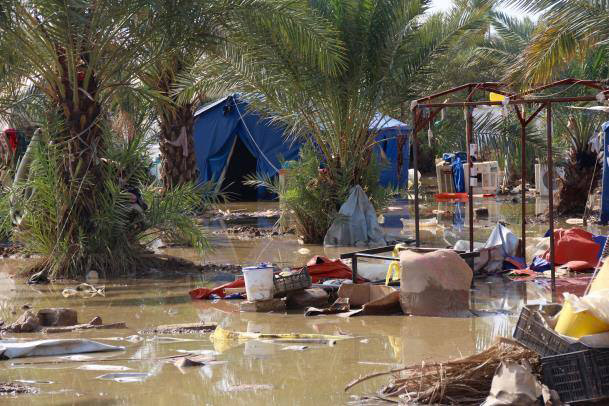
Flooding in Baghdad, emergency response hurt by lagging funds: UN relief wing
“The flood affected areas are causing public health risks,” according to the bulletin issued by the UN Office for the Coordination of Humanitarian Affairs (OCHA).
It said, “Health partners are increasing epidemiological surveillance as the floods may lead to an increase in cholera cases, following the week-long incubation period of the virus.”
OCHA also warned that only 44 per cent of the $498 million requested in the Humanitarian Response Plan for Iraq for the July-December 2015 period has been received, and that the response to the ongoing cholera outbreak is also undermined by the poor funding status.
According to the bulletin, more than 2,400 people across 15 of 18 Iraqi governorates have contracted cholera since the outbreak was declared in mid-September, and that in late October, health partners started a vaccination campaign targeting about 250,000 internally displaced Iraqis and Syrian refugees staying in 62 camps to prevent cholera transmission in high-risk areas.
“The flooding in and around Baghdad delayed vaccinations in some locations, but the teams managed to reach most planned sites by early November,” it said.
The heavy rains in late October caused flooding in and around Baghdad, and sewer systems have overflowed and caused open sewage to mix with floodwaters, according to OCHA.
The floods also contributed to increased power outages as many power stations were flooded and authorities have reported deaths caused by electrocution.
A status of emergency in areas overwhelmed by the heavy rains was declared on November 1, it said.
“Humanitarian partners estimate that the floods have affected at least 84,000 displaced people staying in more than 40 sites and camps, mostly in Baghdad and Anbar governorates,” the bulletin said, and reported that the number of affected people may rise as partners receive more information about conditions on the ground.
Meanwhile, as colder weather is fast approaching, humanitarian actors have started distributions of blankets, quilts, warm clothing for children, kerosene, heating stoves, jerry cans, and thermal floor mats and insulation to make tents warmer and more resistant to winter conditions.
About 400,000 people urgently need shelter assistance and at least 780,000 people lack essential household and other life-sustaining items this winter, according to the bulletin.
At least 8.7 million Iraqis require humanitarian assistance; but preliminary assessments that will inform the humanitarian needs and strategic planning for 2016 indicate this figure will be over 10 million, OCHA said.
The figures include more than 3.2 million people internally displaced since January 2014, 415,000 returnees, and 247,000 Syrian refugees. Over 2 million people live in areas under control of the Islamic State of Iraq and the Levant, known as ISIL or Da’esh.
Photo: OCHA/Themba Linden/www.justearthnews.com
Support Our Journalism
We cannot do without you.. your contribution supports unbiased journalism
IBNS is not driven by any ism- not wokeism, not racism, not skewed secularism, not hyper right-wing or left liberal ideals, nor by any hardline religious beliefs or hyper nationalism. We want to serve you good old objective news, as they are. We do not judge or preach. We let people decide for themselves. We only try to present factual and well-sourced news.







